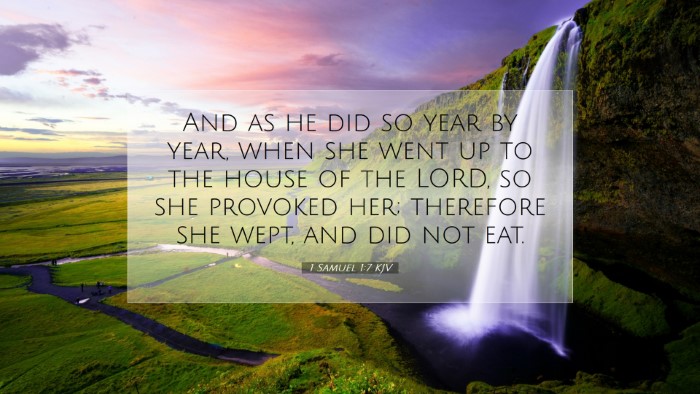Commentary on 1 Samuel 1:7
1 Samuel 1:7 (KJV): "And as he did so year by year, when she went up to the house of the Lord, so she provoked her; therefore she wept, and did not eat."
Introduction
The passage in 1 Samuel 1:7 sets the stage for the intimate and poignant narrative surrounding Hannah amidst her distress and deep longing for a child. The emotional landscape is vital for understanding the theological implications concerning prayer, desperation, and divine intervention.
Contextual Background
This verse occurs within the larger narrative of Hannah's life, a woman whose anguish is exacerbated by both societal expectations and personal strife. Hannah is one of the key figures in the opening chapters of Samuel, and her story reveals much about the character of God in responding to human sorrow.
Matthew Henry's Commentary Insights
Matthew Henry offers a profound analysis, noting the repetitive nature of Hannah's pilgrimage to the house of the Lord. Each year, her sorrow is compounded by Peninnah's taunts, displaying both the cruelty of her adversary and Hannah's resilience. Henry emphasizes:
- The importance of communal worship despite personal suffering.
- Hannah's annual visits highlight her commitment to God, even in the face of bitterness.
- Her tears are a reflection of both pain and a deep yearning for spiritual fulfillment.
Henry suggests that Hannah’s weeping represents a type of prayer, a communication with God that transcends mere words, indicating that God values our sincere emotions as part of our worship.
Albert Barnes' Perspective
Albert Barnes comments on the social and spiritual dimensions of Hannah's plight. He interprets her weeping not only as a result of personal tragedy but also as a lament for the absence of spiritual strength and the fulfillment of divine promise. Key points from Barnes include:
- The spiritual significance behind her annual journey, symbolizing worship and dedication.
- The provocation by Peninnah illustrates the harsh realities of living in a culturally pluralistic society.
- Hannah's refusal to eat amid sorrow signifies how grief can impact one’s physical and spiritual vitality.
Barnes posits that Hannah’s deep sorrow is a fertile ground for miracles, suggesting that God often allows distress as a means to draw us closer to Him.
Adam Clarke's Commentary Insights
Adam Clarke provides additional layers to Hannah's story by examining the theological implications of her suffering. His analysis suggests:
- Hannah serves as a type of Christ, embodying the concept of suffering leading to divine purpose.
- The phrase "year by year" underscores the persistence of Hannah’s trials and her unwavering faith.
- Clarke draws attention to the importance of supplication in moments of despair, emphasizing how sincere prayer can facilitate breakthroughs.
Clarke also relates the significance of Hannah’s tears as reflective of the afflictions of God’s people, connecting her personal story to the collective experience of the faithful.
Theological Implications
This verse captures the essence of human despair and the potency of faith. The various commentaries reveal that:
- Hannah’s anguish is not in vain; it precedes a dramatic encounter with God.
- The suffering of the faithful can lead to significant acts of divine grace, offering hope to those in despair.
- Worship amidst difficulty is a testament to one’s faith and commitment to God.
The spiritual struggle displayed by Hannah echoes the experiences of many believers throughout scripture, inviting a deeper understanding of sorrow and redemption.
Conclusion
1 Samuel 1:7 is a rich tapestry of human emotion intertwined with divine purpose. The insights from Matthew Henry, Albert Barnes, and Adam Clarke converge to emphasize that Hannah's experience is not merely about personal loss but highlights a profound theological journey. Her weeping and refusal to eat can be seen as a form of deep spiritual wrestling, ultimately leading to God's intervention. This passage encourages pastors, students, theologians, and scholars to reflect on how we bear our burdens before the Lord and how our struggles can patch the fabric of divine providence.


